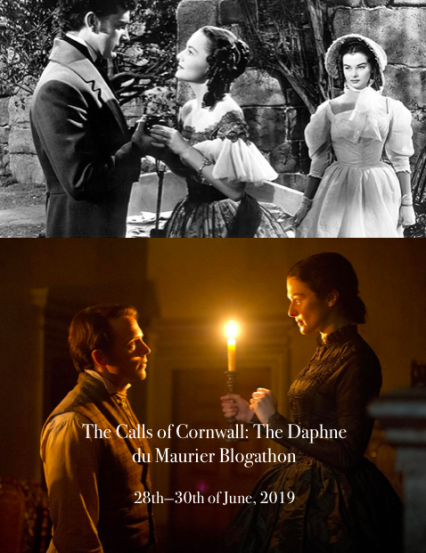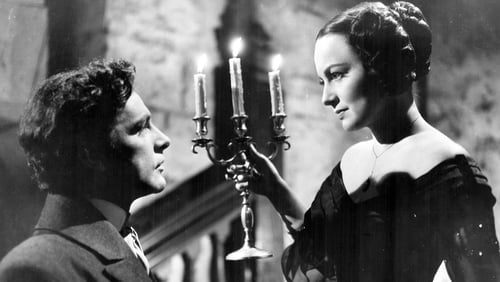This post is part of The Calls of Cornwall: The Daphne du Maurier blogathon, hosted by Pale Writer. See the other posts here.
Poor Philip Ashley. He falls in love, suddenly and irrevocably, with a woman beyond compare. He makes no secret of his devotion, defends his lady’s honour, worships her beauty and grace, and rejoices in the knowledge that he is loved in return. All would be well, except My Cousin Rachel isn’t really a romance: it’s a labyrinth of obsession, manipulation and lies.
An orphan and only child, Philip grows up on the coast of Cornwall under the care of his cousin Ambrose (John Sutton), whom he loves as a brother, father and friend. His childhood is a happy one, but not without ominous touches. Ambrose walks the boy past the gibbet at the crossroads, so young Philip can see the body hanging there and learn the price for murder. As the years pass Ambrose’s health worsens, until his doctors advise him to leave Cornwall for the winter. He sets off for Italy, with Philip (a young Richard Burton) reluctantly staying behind to look after the estate. In Florence, Ambrose meets Rachel Sangoletti (Olivia de Havilland)—a cousin of the Ashleys’ by marriage—and marries her.
Writer Nunnally Johnson appoints Philip the film’s narrator and wisely gives Burton some wonderful lines, including this voice over as Philip stares out at a roiling sea: “I came to be troubled by strange and formless fears, wholly without reason, but persistent and nagging, and in some ways ominous.”
Soon Philip receives desperate letters from Ambrose accusing Rachel of ill-treatment. He rushes to Florence but arrives too late: Ambrose is dead. The death certificate cites a brain tumour and Rachel makes no claim on her late husband’s estate, but Philip is convinced she is to blame and swears vengeance—an oath which begins to crumble when he first sets eyes on her.
Several years ago, my mother and I were having dinner with a friend when the conversation turned to Daphne du Maurier. My mother mentioned ‘The Blue Lenses’—a short story about a woman who begins to see the people around her with terrible clarity—and though neither woman had read the story in decades, they both remembered it in impressive detail. I should have taken that as a warning. Much later, I read the story myself and could think of nothing else for days. Daphne du Maurier wrote stories enveloped in anxiety and dread, where menace lurked in the most mundane circumstances and a wrong turn down an alley in Venice could lead headlong into the uncanny. Her tales crawl inside your skull and take up residence; My Cousin Rachel is no exception.
The mind games begin when Philip first meets Rachel. Johnson and director Henry Koster make the audience wait: despite being the title character, Rachel doesn’t appear until well into the film’s first half hour. Philip invites Rachel to the Ashley estate and marches into her room ready to do battle, only to be confronted not with the black widow spider of his imaginings, but a woman with all the beauty and warmth at Olivia de Havilland’s considerable disposal. Even Philip’s dog (a birthday present from Ambrose when he was a boy) is taken with her and sits contentedly by her feet. Righteous certainty gives way to doubt. How can his cousin Rachel, so gracious and so kind, be the harpy Ambrose described?
Rachel is enigmatic—whether by nature or design is left as an exercise for the viewer—and de Havilland plays her with a serenity that is simultaneously accessible and impenetrable.
My Cousin Rachel actually revolves around Philip, a man completely without guile. At last he confronts Rachel with Ambrose’s letters, his reservoir of anger let loose, only for her to collapse, weeping. Ashamed, he tears the letters from her hands and throws them into the fire. Philip knows no half measures; he feels everything deeply. Burton burns at such a white heat I half expected the screen to ignite. When Rachel retires for the night, Burton watches her go with a remarkable combination of obsession and awe that informs every choice Philip makes from then on, self-preservation be damned. The only thing surprising about the Oscar nomination he received (his first) is the category: Best Supporting Actor, for what is clearly a leading role.
The central mystery animating My Cousin Rachel isn’t as difficult to unravel as Johnson or Koster would have audiences believe, but that doesn’t matter. What keeps you watching is the atmosphere of foreboding, the slow, steady accumulation of dread as Philip is driven by a compulsion stronger than reason. His hunger for Rachel burrows into you and refuses to let go.


Really good review! I’ve never seen this film, but your article makes it sound interesting. By the way, I nominated you for the Blogger Recognition Award! Here’s the link to my post:
https://18cinemalane.wordpress.com/2019/07/09/i-received-my-first-blogger-recognition-award/
Thank you and thank you for nominating me for the award too! It’s very kind of you and I really appreciate it.